

¿CÓMO SE PRONUNCIA EL LATÍN?. LA PRŌNUNTIĀTIŌ RĒSTITŪTA. Vocales Cada una de las cinco vocales A, E, I, O, U puede pronunciarse larga o breve, lo que nos da un total de diez sonidos vocálicos.
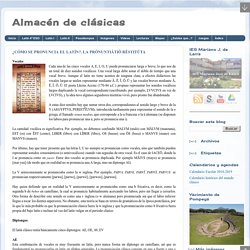
Una vocal larga debe sonar el doble de tiempo que una vocal breve. Aunque el latín no tiene acentos de ninguna clase, a efectos didácticos las vocales largas se suelen representar mediante Ā, Ē, Ī, Ō, Ū y las vocales breves mediante Ă, Ĕ, Ĭ, Ŏ, Ŭ. LATIN 4e. NAHUATL. Español. New Data Show “Gender-Affirming” Surgery Doesn’t Really Improve Mental Health. So Why Are the Study’s Authors Saying It Does? - Public Discourse. A new study appearing last month in the American Journal of Psychiatry concluded that “gender-affirming” surgery is associated with reduced demand for subsequent mental health treatment in a sample of persons diagnosed with “gender incongruence.”

Predictably, such news received wide media interest and coverage. And yet even a cursory reading of the study itself tells a far less optimistic story than the media narratives—as well as the authors’ own inexplicable confidence—have offered. How should we pronounce Latin? Ecclesiastical or Classical? Where Catholics Learn Latin. 12 Letters That Didn't Make the Alphabet. You know the alphabet. It’s one of the first things you’re taught in school. But did you know that they’re not teaching you all of the alphabet? There are quite a few letters we tossed aside as our language grew, and you probably never even knew they existed. 1. LATIN. Linguistics. Palabras en nahuatl – Nahuatl.
> Consulta el diccionario completo náhuatl – español < Las siguientes palabras en náhuatl son las más básicas y las primeras que se aprenden en un curso normal de náhuatl clásico.
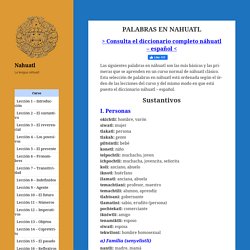
Esta selección de palabras en náhuatl está ordenada según el órden de las lecciones del curso y del mismo modo en que está puesto el diccionario náhuatl – español. Las 13 frases o palabras que dicen más los juarenses, según los lectores. Las 19 palabras y frases que todo juarense dice a diario. Global Latinists by John Byron Kuhner. When Leni Ribeiro Leite stood up in the main auditorium of Memorial Hall this past July, her name and appearance were enough to distinguish her: it’s still unusual on the University of Kentucky campus, where Hispanics make up about one percent of the faculty, to see a Hispanic woman at the lectern.

Evidence Rebuts Chomsky's Theory of Language Learning. The idea that we have brains hardwired with a mental template for learning grammar—famously espoused by Noam Chomsky of the Massachusetts Institute of Technology—has dominated linguistics for almost half a century.
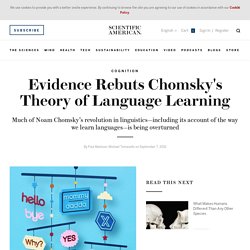
Recently, though, cognitive scientists and linguists have abandoned Chomsky’s “universal grammar” theory in droves because of new research examining many different languages—and the way young children learn to understand and speak the tongues of their communities. Negative Existentials, Causal Theory, and God: Notes on Donnellan. Causal theories of reference strike me as hopeless, which is not to say that descriptivist theories are in the clear.
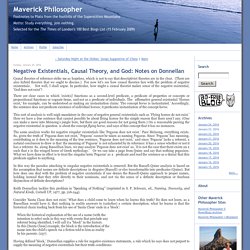
(There are also hybrid theories that we ought to discuss.) For now let's see how causal theories fare with the problem of negative existentials. Not well, I shall argue. In particular, how might a causal theorist makes sense of the negative existential, 'God does not exist'? Christians, Muslims, and the reference of “God” The question of whether Christians and Muslims worship the same God has become the topic du jour in certain parts of the blogosphere.

Do Christians and Muslims Worship the Same God? Francis Beckwith and Dale Tuggy, two philosophers I respect, answer in the affirmative in recent articles.
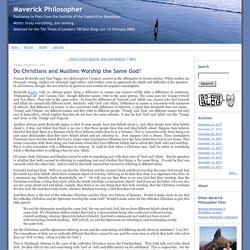
While neither are obviously wrong, neither are obviously right either, and neither seem to appreciate the depth and difficulty of the question. In all fairness, though, the two articles in question were written for popular consumption. Beckwith begins with an obvious point: from a difference in names one cannot validly infer a difference in nominata. 'Muhammad Ali' and 'Cassius Clay,' though different names, refer to the same person. Some Rules of Language are Wired in the Brain. Here’s a test.

Without looking them up on Google, try to guess the meanings of the foreign antonyms tobi and kekere. They are words in Yoruba, a widely spoken West African language that has its roots in the Old Stone Age. The words are equivalent to the English antonyms big, small. Exact and approximate arithmetic in an Amazonian indigene group. The Origin of Roman Numerals (video) How to Speak Middle English. Learn to Read Korean in 15 Minutes. Popular Carols in Latin.
Aleph-Bet Video. Book Review: Drout’s Quick and Easy Old English - Medievalists.net. Drout’s Quick and Easy Old English.

The Underground Grammarian - Richard Mitchell. Sixteen (16) Christmas Carols … In Latin! On a Franciscan website, we found this clever PDF wherein Fr. How to Learn Any Language in Record Time and Never Forget It. Preface from Tim Back in 2012, Gabriel Wyner wrote an article for Lifehacker detailing how he learned French in 5 months and Russian in 10, using mostly spare time on the subway. That article went viral. 'Tis the season for archaic English. 12 Letters That Didn't Make the Alphabet.